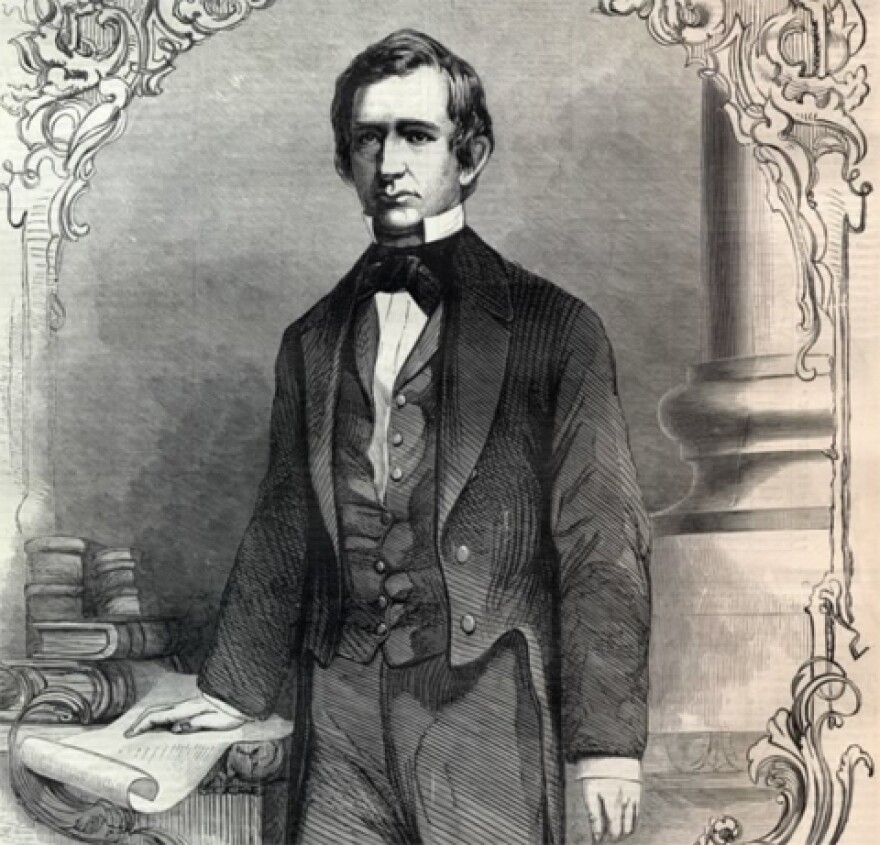Driving on the quiet Route 20, roughly parallel to the NYS Thruway -- a far more peaceful way to go, at the state limit of 55 rather than the 70+ mph of close-packed semis and trucks -- I stopped overnight in Auburn. Auburn is one of those towns in New York's Finger Lakes region, some with delightful names like Canandaigua, Cazenovia, Skaneateles.
Stretching my legs I found myself outside this solidly built house/museum where William Henry Seward had lived. The plaque said that he was a NY Senator, governor of NY, a US Senator and finally Secretary of State under Abraham Lincoln. The purchase of Alaska is sometimes referred to as 'Seward's folly'. It's interesting to note that he might have been President, had not Lincoln been chosen over him.
Seward had been born not far from Goshen, and his rather harsh father is listed (in Stahr's biography, [ref.1]) as physician, merchant, farmer, slaveowner and judge. At 15 the young Seward was a beginning student at Union College, Schenectady, reached via steamer up the Hudson from Newburgh. He did well, but at the start of his senior year he had a falling out with his father concerning money, and he and a friend left College and went by boat from NY City to Georgia. There, barely eighteen, Seward was hired as a teacher (and rector!) of a small school. It's astonishing today to realize that educated teenagers could get such jobs -- think also of the young John Burroughs -- but that's how it was.
However, within a short time he had decided to return from Georgia to finish his degree. Managing to obtain a substitute who was acceptable to the Georgia school, Seward returned to Union College, graduating while still only 19.
Back at home again he began to study law, and at 23 passed his bar exam. Realizing that he absolutely didn't wish to practise law in Goshen, he decided to go to the north-west of the state, specifically to Cayuga's County Seat, the then-small town of Auburn,150 miles west of Albany. A contributing reason for choosing Auburn was that his sister's friend from the Emma Willard School, Frances Miller, lived there with her father Judge Miller. Seward was accepted into Judge Miller's law offices, and married Frances. They were roughly the same age, she nearly 2" taller than his 5'6", and they lived in father-in-law's large and lovely house -- the one with the plaque outside it in Auburn.
Albany was about 4 days away by stage coach -- no satisfactory rails yet. As a young Senator, and then as Governor of NY, Seward thus had to spend long periods away from his wife and children, but let's fast-forward to when he was 60, and his wife with him, in Washington. He was now Secretary of State under Lincoln, and was laid up in bed with a broken arm after a Washington carriage accident. It is 1865, the year that the actor John Wilkes Booth and his associates were planning to assassinate 3 leaders on the same night -- the President, Vice President Johnson, and Secretary of State Seward. Seward's would-be assassin, Powell, arrived at Seward's house in the evening, with a hidden pistol and knife, carrying a small package purportedly from Seward's doctor. The young black doorman did not want to let Powell in, and said he would take the medicine up to Seward's bedroom, but Powell was persuasive and began up the stairs. At the top of the stairs Powell was confronted by one of Seward's grown sons, who stopped Powell and said he would carry the medicine for him, and that Powell could not enter the bedroom. Powell pushed his way into the bedroom and what ensued was a battle, a misfired pistol and deep knife wounds to Seward's face, neck and shoulder. Later photographs show the resultant lop-sidedness from Powell's assassination attempt.
After his wife's death Seward lived on a further 6 years. Upon retirement he travelled widely, with a 40 years younger friend -- Olive Risley -- whom he adopted as a daughter, in order to curtail gossip.
Having gradually lost the use of his hands, perhaps due to the assassination attempt, he died in Auburn at the age of 72.
I was glad I took the back roads, rather than the crowded Thruway.
References:
1. "Seward; Lincoln's Indispensable Man" by Walter Stahr; Simon & Schuster, 1230, Avenue of the Americas, New York, NY 10020, (2012).
Dr. David Nightingale is Professor Emeritus of Physics at the State University of New York at New Paltz and is the co-author of the text, A Short Course in General Relativity.
The views expressed by commentators are solely those of the authors. They do not necessarily reflect the views of this station or its management.




